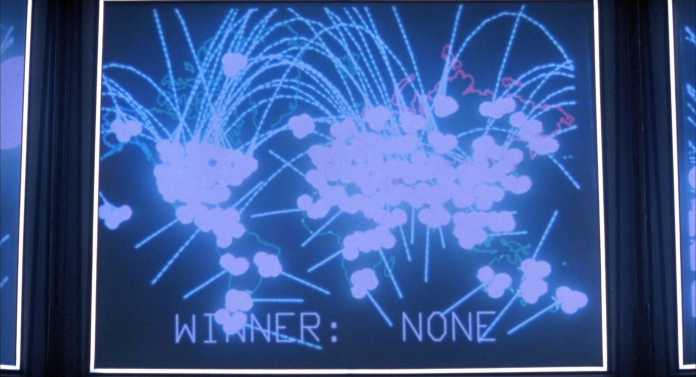“WarGames” regularly tops lists of best hacker movies. At the same time, next to “Tron” is the classic among films about computer games. Like no other film from the 80s, it inspires young people about information technology and shows the possibilities of data transmission. At a time when home computers are becoming more and more popular. “WarGames” was released in US theaters on June 3, 1983, the film will be 40 years old.
When David explains to his classmate Jennifer in a few sentences how he gets into someone else’s computer, millions of moviegoers hang on his every word. For the first time they see someone connecting to a remote computer via telephone and acoustic coupler to chat, get information, play games. Strictly speaking, this anticipates the third episode of the “Simon & Simon” TV series, although it was not broadcast in Germany until 1986.
Incidentally, “WarGames” impressively shows the practical use of this knowledge: David hacks into the school computer to improve his grades. In order to obtain the necessary password (“pencil”), he provokes discussions with the director, in whose anteroom the regularly changed password is noted.
When he comes across an advertisement for the new computer company Protovision, he tries to get hold of their unreleased games. His computer now calls all numbers to filter which line another computer answers. Wardialing, a technique popularized by the film and made usable by the later C64 War Games Autodialer program. Thanks to a manipulated extension, there are no charges for numerous long distance calls.
World thermonuclear war
When David found the supposed Protovision computer, he was able to bring up a list of games. But access is denied for lack of identification. Two expert friends from the university help him further: the inventor often hides a backdoor in systems to re-enter later with a simple password, and the name of the game “Falken’s Maze” is a reference to the developer. David learns that Dr. Stephen Falken is behind it, who, up until his (as it later turns out: feigned) death, was primarily concerned with how computers were getting better and better at playing games like chess and learning from your mistakes. How they learn to learn. And David discovers the password: “joshua”, from the name of Falken’s son who died at the age of five.
However, the phone number leads not to Protovision at all, but to a NORAD air defense military computer called WOPR. He is a master at understanding and analyzing attack scenarios, but he doesn’t know when to give up. And since he doesn’t distinguish between simulation and reality, he wants to win the “Global Thermonuclear War” game in reality, which David and Jennifer start at home on the Soviet side.
At the last moment, the heroes get one last inspiration: By letting “Joshua” play tic-tac-toe, which usually results in a draw, the computer learns that some games cannot be won. He realizes that even in a nuclear war there is no winner, no matter who starts it and how it’s fought – and doesn’t light the missiles: “It’s a strange game. The only winning move is not to play.”

The serious topic of “WarGames” has not lost its relevance.
(Image credit: MGM/20th Century Fox)
Still updated
As surprising as it is scary: all the themes of “WarGames” are still relevant 40 years later. Passwords still exist, and there are ways to cheat them. The fear of using nuclear missiles remains. Scenarios are run by computers. Another important consideration: even if a nuclear attack has only a few minutes to react, can a machine be allowed to press the red button? The film is still very fresh when, in September 1983, software in the Soviet Union interpreted the sunrise and reflections of the clouds as a missile attack – and only a level-headed officer prevented a counter-attack.
Originally, however, it was not meant to be about computers and nuclear missiles. The screenwriters are fascinated by Stephen Hawkins, they come up with a film about such a luminary with the working title “The Genius”, who helps a gifted student out of trouble. For the actor, they are planning with John Lennon (who is still alive at the time of brainstorming). Insights into the world of hacking and a report in Harper’s Magazine about NORAD’s underground military computer nudge the script in a plausible direction.
Director Martin Brest makes the film very dark, which the studio cannot handle. Filming was already underway when he was pulled from the project and replaced by John Badham, who was still working on Blue Thunder. Badham transforms a depressed leading actor into an intelligent one and greatly expands Jennifer’s role: she originally does not appear in the second half.
The new key is supported by the funky synthesizer sound of Arthur B. Rubinstein (who previously composed “Blue Thunder”). A masterpiece is the huge set with countless monitors, which is supposed to represent the command center of NORAD. While the film is primarily set in Seattle, it will be filmed on both the East and West coasts.
Three Oscar nominations
“WarGames” not only has a great influence, but is also an economic success. It grossed more than 100 million dollars and ranked 5th among the most successful films of the year in the United States, even ahead of James Bond. It was nominated for three Academy Awards (screenplay, camera, sound). It won’t make its way to West Germany until October, where it only reaches 22nd in the charts.
For Matthew Broderick, it is the first major role that many will follow, especially “Ferris Bueller’s Day Off” three years later. There he hacks into the school computer again. Ally Sheedy later played in ‘The Breakfast Club’ among others; In 1986, John Badham gave her the lead role in ‘Number 5 Lives’. A decade after “WarGames”, screenwriters Lawrence Lasker and Walter F. Parkes manage to create another cult film about hackers – “Sneakers – The Silent Ones” with Robert Redford.
(Then)




